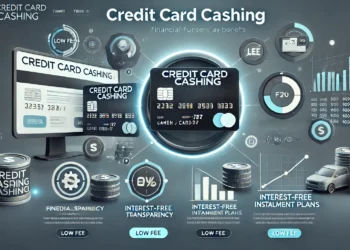
In today’s dynamic economy, entrepreneurs and freelancers play a crucial role in driving innovation and growth. With the rise of self-employment, many individuals are exploring funding options to expand their ventures or stabilize their finances. Often, the choice boils down to either a business loan or a personal loan for self-employed individuals. Understanding the nuances of eligibility for a business loan as compared to a personal loan is essential for making informed financial decisions.
Understanding Business Loans
A business loan is a financial product designed specifically to meet the needs of a business. It can take various forms, including term loans, lines of credit, or equipment financing. These loans are offered by banks, credit unions, and online lenders to help businesses expand operations, manage cash flow, or purchase equipment.
Eligibility Criteria for a Business Loan
Eligibility for a business loan is typically determined by a set of criteria specific to business operations. Let’s delve into the primary factors that lenders consider:
- Business Plan and Purpose: Lenders evaluate the business’s purpose for seeking the loan. A detailed business plan showcasing clear objectives, strategies, and potential returns significantly improves eligibility. Your business plan should reflect market analysis, financial projections, and growth strategies, convincing lenders of your business’s potential.
- Credit History: Your business credit score plays a crucial role in determining loan eligibility. A higher score reflects creditworthiness and reassures lenders about the timely repayment of the loan. If your business doesn’t have an established credit history, often the personal credit score of the business owners is considered.
- Business Age and Stability: Most lenders require that the business be operational for at least six months to a year. The longer the enterprise has been running successfully, the better the chances of securing a loan. Lenders favor stable businesses with consistent revenue histories.
- Revenue and Cash Flow: Lenders assess the business’s financial health, including revenue streams and cash flow. Providing detailed financial statements, including profit and loss statements, balance sheets, and cash flow forecasts, is essential. Businesses with strong revenue streams and positive cash flows are more likely to meet eligibility requirements.
- Collateral: Some business loans may require collateral. Offering property, equipment, or other assets can strengthen your eligibility profile, as it reduces the lender’s risk.
- Industry Type: Depending on the lender, certain industries may be considered riskier than others. This affects the eligibility of businesses operating within those sectors. Familiarity with industry standards can provide insight into eligibility prospects.
- Legal Compliance: Businesses must comply with all legal requirements and possess necessary licenses. Lenders may require proof of compliance during the loan approval process.
Understanding Personal Loans for Self-Employed
A personal loan for self employed is a form of unsecured credit that caters to the personal financial needs of entrepreneurs, freelancers, and independent contractors. These loans are generally used for purposes like home renovation, debt consolidation, or bridging financial gaps in daily expenses.
Eligibility Criteria for a Personal Loan for Self-Employed
The eligibility criteria for personal loans often differ from business loans, focusing more on the borrower’s personal financial situation. The key factors include:
- Personal Credit Score: This is one of the most critical factors for eligibility. A strong personal credit score indicates reliability and enhances your chances of obtaining a loan. It reflects your history of managing credit and timely repayment.
- Income Documentation: Since self-employed individuals do not have a fixed salary, lenders evaluate income through tax returns and financial statements. Consistent and sufficient income over the years can positively impact loan eligibility.
- Debt-to-Income Ratio: Lenders assess your debt-to-income ratio to determine financial stability. This ratio indicates how much of your monthly income goes toward debt obligations. A lower ratio is favorable as it suggests better financial management.
- Employment Stability and Experience: Lenders often require proof of self-employment stability. Long-term experience in your field indicates reliability and expertise, which may influence eligibility.
- Age and Citizenship: Most lenders specify a minimum age requirement (typically 18 years old) and require the applicant to be a citizen or legal resident of the country where the loan is offered.
- Repayment History: Your history of repaying past loans promptly can build trust with lenders, enhancing eligibility prospects.
Comparing Eligibility: Business Loan vs. Personal Loan for Self-Employed
While both loans serve distinct purposes, understanding the contrasting eligibility requirements can help self-employed individuals decide which is more suitable for their situation.
Purpose and Use
Business loans focus primarily on funding business activities and growth, whereas personal loans cater to individual financial needs. The clarity of purpose is essential, with business loans requiring detailed plans directly tied to business expansion.
Credit Evaluation
For business loans, the credit evaluation leans more towards the business’s creditworthiness, whereas personal loans emphasize the individual’s personal credit history. Business owners with strong personal credit can leverage it for both loan types, though it holds more weight for personal loans.
Documentation and Processes
Business loans typically require comprehensive documentation proving business health, stability, and strategic planning. This includes business plans, financial statements, and collateral, if applicable. Meanwhile, personal loans necessitate income verification and personal credit history, simplifying the process somewhat relative to business loans.
Risk Assessment
Business lenders assess industry risks and business stability, often considering market trends that could impact business success. In contrast, personal lenders assess individual financial stability and income consistency, focusing heavily on personal credit scores.
Financial Implications and Costs
Business loans often come with varying interest rates influenced by the industry, business stability, collateral risks, and more. Personal loans, however, come with predetermined rates primarily based on personal credit scores and income levels.
Flexibility and Terms
Business loans can offer flexible terms aligning with business growth rates and seasonal fluctuations. Unlike personal loans, which tend to offer fixed terms—making them predictable and stable but potentially less adaptable to changing financial circumstances—business loans provide greater financial agility. You can explore tailored loan options, manage repayments, and track disbursals conveniently using the Bajaj Finserv App, which simplifies access to business financing anytime, anywhere.
Making an Informed Decision
Being self-employed allows you the freedom to choose the path best suited for your financial needs, whether through a business loan or a personal loan. Consider the following before making your decision:
- Assess Your Needs: Clearly evaluate whether the funds are strictly required for business expansion or personal finance management.
- Evaluate Financial Health: Understand your credit scores, income streams, and overall financial standing prior to application.
- Review Lender Offers: Compare various lenders, interest rates, and terms to ensure you get the best deal.
- Understand Risks and Benefits: Each loan type involves specific risks and potential benefits. Evaluate these in light of your long-term financial goals.
- Seek Professional Advice: Consulting a financial advisor can provide clarity and professional insights tailored to your unique situation.
By comprehensively understanding the eligibility for a business loan versus a personal loan for self-employed individuals, you become better equipped to navigate the financial landscape and secure the ideal type of funding for your goals.
Conclusion
In conclusion, as the entrepreneurial world continues to grow, the options for securing funding will expand, but the fundamentals of loan eligibility remain rooted in a thorough understanding of your financial standing and the lender’s requirements.



